Part time MSW programs may allow you to begin a career in the field of social work or to further an existing career as a social worker.

Within an academic context, social work is the study of society and how we can improve the well-being of our communities.
Editorial Listing ShortCode:
As a profession, social work involves working for government agencies, private nonprofit charities, or other organizations to provide people with resources and to help people improve their lives.
Part Time MSW Programs

A part time MSW program can help you learn about ways to help people in your community who are dealing with a variety of different problems.
This could include helping immigrants, elderly people, developmentally or physically disabled people, impoverished families, or others in need. A masters in social work may help prepare you with the knowledge and skills you need to understand problems in your community and how to solve them.
If you enroll in an MSW program part time, you will likely study psychology, sociology, law, social justice, child development, social welfare policy, political science, and mental health practice. Social work graduate programs also usually require completing 900 hours of field education.
Editorial Listing ShortCode:
Both full-time and part-time MSW programs are available online and on traditional campuses. Online MSW programs may provide a way for you to earn this type of degree with a highly flexible schedule. An MSW degree can be useful for career paths in the field of social work, and there are many different types of social workers.
Some social workers work in treatment centers for people suffering from mental health problems. Social workers may also be employed by Child Protective Services or other government agencies. There are many different paths you could potentially take with a Master of Social Work.
Part-Time vs. Full-Time MSW Programs
When you are looking at social work graduate programs, one of the factors to consider is whether you would prefer to attend school part time or full time. Both of these options are available in online and on-campus formats.
Enrollment

The main difference between enrolling in a full-time degree program and enrolling in a part-time degree program is the number of courses you take each semester.
Full-time graduate students usually take 3 or 4 courses per semester while part-time students usually only take 1 or 2.
Both part-time and full-time social work graduate programs sometimes use a cohort model, in which students progress through courses as a group. This model is often very structured, prescribing exactly which courses you take every semester.
Part-time on-campus programs may have classes at night or on weekends. Degree programs that are both part-time and online often allow for very flexible scheduling.
Some programs use an alternate academic calendar in which students take just 1 or 2 courses in a very short period of time, such as 6 weeks, 8 weeks, or 10 weeks. Classes may also be available year-round.
Time to Completion

Full-time students can usually complete a master’s degree in social work in 2 years. Students who obtained their bachelor’s degrees in social work may qualify for advanced standing at some universities. This may allow them to complete their degrees in as little as 1 year.
Part-time students usually need 3 or 4 years to complete their degrees. Part-time degree programs usually offer flexible scheduling, so many factors can affect exactly how long it takes to earn a social work master’s degree part-time.
Editorial Listing ShortCode:
You may be able to finish your degree at a quicker pace as a full time vs part time student. Alternate academic calendars may also affect how quickly you can progress through the degree program. Plus, some universities offer accelerated MSW programs that may get you through your program more quickly.
Pros and Cons
| Part-Time MSW | Full-Time MSW | |
| Pros |
|
|
| Cons |
|
|
Social Work Careers & Salaries
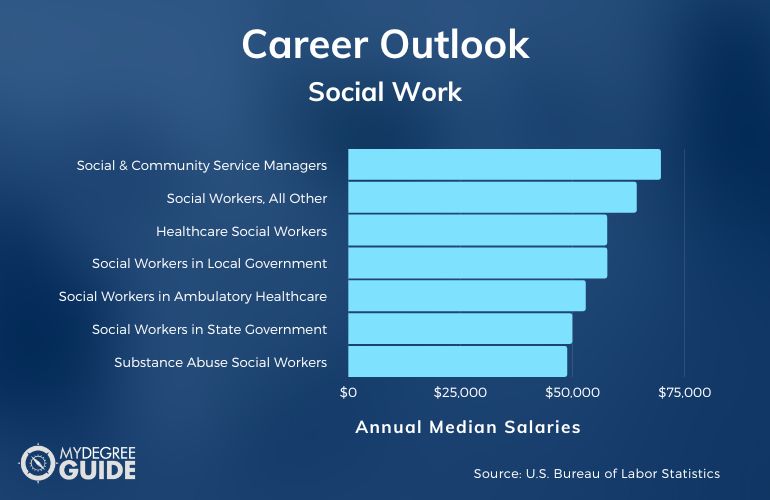
Social workers may be employed by state or local government agencies or by private organizations. They may work in healthcare, substance abuse treatment, mental health treatment, and other fields that aim to help people in need.
According to the Bureau of Labor Statistics, clinical social workers require a masters degree as well as state licensure and supervised clinical experience.
| Careers | Annual Median Salaries |
| Social and Community Service Managers | $69,600 |
| Social Workers, All Other | $64,210 |
| Healthcare Social Workers | $57,630 |
| Social Workers in Local Government | $57,660 |
| Social Workers in Ambulatory Healthcare Services | $52,850 |
| Social Workers in State Government | $49,860 |
| Mental Health and Substance Abuse Social Workers | $48,720 |
| Child, Family, and School Social Workers | $48,430 |
| Substance Abuse, Behavioral Disorder, and Mental Health Counselors | $47,660 |
| Social Workers in Individual and Family Services | $43,820 |
Social work occupations provide higher than average annual salaries, and the field is projected to grow by 13% in the next ten years (Bureau of Labor Statistics).
Social Work Master’s Curriculum & Courses

Here are examples of courses you may be required to take as part of a master’s degree program in social work.
- Introduction to Social Work: This course provides an overview of social work in general.
- Human Behavior and the Environment: In this course, you’ll study how people’s behavior is influenced by their surroundings and experiences.
- Death and Dying: In this course, you will study how people cope with the deaths of other people and how they approach their own deaths.
- Dynamics of Racism and Oppression: This course discusses discrimination that minorities may face.
- Assessment and Diagnosis: This course teaches about how people’s mental health is evaluated in a clinical setting and how people are diagnosed with mental disorders.
- Couple and Family Therapy: This course covers how to help couples navigate relationship problems in a clinical setting and how to help their children if needed.
- Social Work Services for Older Adults: This course will teach you about recognizing and meeting the needs of geriatric members of the community.
- Substance Abuse: This course will discuss how people are affected by addictions and how to help them and their families.
- Strategic Planning for Public and Nonprofit Organizations: This course will teach you about how both public and private social work agencies can grow their services and sustain themselves.
- Field Study: In addition to regular coursework, earning a master’s degree in social work will often involve gaining real life experience in the field.
Social work is an interdisciplinary study that combines aspects of psychology, sociology, and economics, among other things.
How to Become a Social Worker

If your goal is to become a licensed social worker, he following steps are typically required:
- Master’s degree. A master’s degree in social work is necessary to become a licensed social worker or to work in a clinical setting. If you have a bachelors in another field, you can still begin your study of social work at the graduate level.
- State licensing. Once you have your masters, you may need to pursue further licensing and certifications with your state, depending on your specialty. Some states also require that clinical social workers be certified by the National Association of Social Workers.
- Supervised work experience. Most state licensing requirements include around 2 years of supervised clinical work experience.
If you have already obtained a bachelor’s degree in social work, some universities may give you advanced standing upon entering a MSW. This may allow you to complete the degree program more quickly.
Admissions Requirements

Here are some common admissions requirements for graduate degree programs in social work.
- Bachelor’s degree from an accredited institution
- Undergraduate GPA of at least 3.0
- Letters of recommendation
Some graduate programs may also require GRE or GMAT scores, but a number of schools no longer require them.
Accreditation

Before enrolling in any degree program, you may want to ensure that it is regionally accredited. Colleges and universities with regional accreditation have been evaluated by an outside organization and have been found to meet certain standards of quality.
A degree from a regionally accredited school will likely have more credibility with employers. For more information about accreditation, you can visit the U.S. Department of Education‘s website.
In the field of social work specifically, degree programs are also typically evaluated and accredited by an organization called the Council on Social Work Education.
Social Work Licensure and Certifications

If you wish to become licensed, you may become a clinical social worker. This career path may open up more job opportunities in the field.
Each state has its own specific requirements for licensure. It is generally required that you first earn a master’s degree in social work from a program that is accredited by the Council on Social Work Education.
Another common requirement is the completion of 3,000 to 4,000 hours of supervised work experience under someone who is already licensed. This work experience usually takes 2 years to fulfill and takes place after you’ve earned your graduate degree. You may also need to pass an exam as well as a criminal background check.
Editorial Listing ShortCode:
There are several different types of social work licenses: Licensed Social Worker (LSW), Licensed Independent Social Worker (LISW), Licensed Clinical Social Worker (LCSW), and Licensed Independent Clinical Social Worker (LICSW). Of these, the LSW is the most basic. Obtaining other types of licenses may require fulfilling additional requirements.
As a social worker, you may have the option of earning various types of specialty certifications from the National Association of Social Workers. These certifications usually need to be renewed every 2 years and require continuing education.
Financial Aid and Scholarships
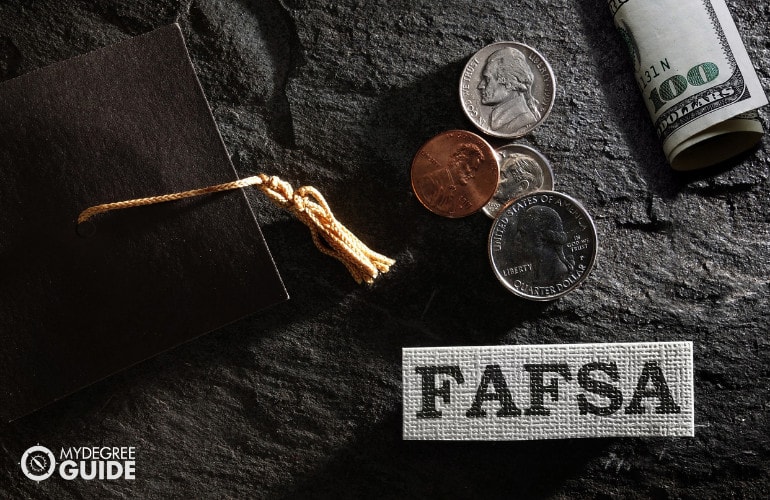
If you need assistance paying for your tuition, you may be able to qualify for financial aid. There are many different types of financial aid available, such as federal aid, state aid, employer programs, and scholarships.
You may even receive assistance from your employer if your degree is relevant to your current job. To find out if you qualify for federal financial aid, you can fill out the Free Application for Federal Student Aid (FAFSA).
What Is an MSW?

An MSW is a master’s degree in social work. The study of social work is all about recognizing and meeting the needs of vulnerable people in the community.
As an academic discipline, it involves the study and application of knowledge from the social sciences, including psychology, sociology, and economics.
Are MSW Programs Hard to Get Into?
Admissions requirements for MSW programs can vary widely among accredited universities. Some universities may require GRE scores while others do not.
Some universities may require prospective students to participate in an interview or provide letters of recommendation. Whether a social work graduate program is difficult to get into is often dependent on the university’s specific requirements. The difficulty level of the admissions process may also vary according to each student’s perception.
What Can You Do with an MSW?

Although what you can do with a bachelors in social work might seem a bit limited, with an MSW, you may find employment as a social worker at many different public and private organizations that serve the community.
Common places of employment for social workers include schools, government welfare agencies, child protective services, mental health care facilities, substance abuse treatment centers, hospices, and adoption agencies.
Common job titles in the field of social work include human services case manager, child welfare case manager, and human services administrator.
How Long Does It Take to Get a Masters Degree in Social Work?
A traditional full-time graduate program in social work typically takes 1 to 2 years to complete. Part-time graduate programs in social work often take 3 or 4 years to complete.
Editorial Listing ShortCode:
Some online degree programs use alternate academic calendars, in which one term may be 10, 8, 6, or even just 5 weeks long. In these cases, you may potentially progress through the program as quickly as a full-time student, even if you take just one class per term year-round.
What Is the Difference Between an MFT vs. MSW?
MFT is a degree in marriage and family therapy. Here are some key differences between MFT degrees and MSW degrees:
| MFT | MSW | |
| Degree’s focus | How to provide counseling to couples and family units | How to provide counseling to individuals |
| Course topics | Students mostly study family and relationship problems | Students also study such topics as poverty, substance abuse, or mental disorders |
| Career emphasis | Helping family units | Helping communities as well as individuals |
There is considerable overlap between these two fields since they both pertain to mental health.
Is an MSW Worth It?

Yes, a master’s in social work is worth it for many students. The Bureau of Labor Statistics projects 12% job growth in community and social service occupations for the next 10 years, much faster than the average for all occupations.
Common social work careers in this field include positions in healthcare, local and state government, ambulatory healthcare services. You may also pursue a leadership position as a social and community service manager.
Employment in the field of social work is expected to grow considerably over the next decade, so this may be a strategic time to begin a career in social work. Aside from the positive job outlook, social work may also provide you the opportunity to help individuals as well as communities.
Universities Offering Part Time Masters of Social Work Degree Programs
Methodology: The following school list is in alphabetical order. To be included, a college or university must be regionally accredited and offer part time degree programs.

Adelphi University offers a Master of Social Work (MSW) that can be earned almost entirely online.
In addition to taking classes in subjects like human behavior and social policy, students also have the opportunity to complete residencies and other on-campus learning experiences. Additionally, students can receive field placement support from the school upon graduation.
Adelphi is accredited by the Middle States Commission on Higher Education.

Arizona State University offers a wide range of classes for students of social work. Their program also requires a certain number of fieldwork hours to prepare students for licensure requirements after graduation. Most classes are online and self-paced, but there are synchronous seminars and practicums with supervised instruction.
Arizona State University is accredited by the Higher Learning Commission of the North Central Association of Colleges and Schools.

At Baylor University, students can earn an MSW in several ways. There are degree tracks for both clinical and community practice.
Depending on a student’s preexisting background in social work, they might qualify for a 60 credit or 32 credit program. They’ll also receive hands-on fieldwork opportunities with established members of the industry to reap the benefits of a social work mentorship.
Baylor University is accredited by the Southern Association of Colleges and Schools Commission on Colleges.
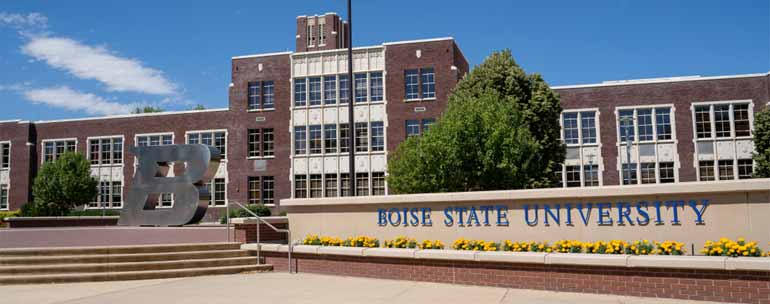
The social work program at Boise State University is entirely online. There are no in-person requirements beyond fieldwork hours that are completed and recorded remotely.
Students can also choose from full-time or part-time programs. Course topics include human development, social welfare policy, and evaluation and treatment of mental disorders.
Boise State University is accredited by the Northwest Commission on Colleges and Universities.
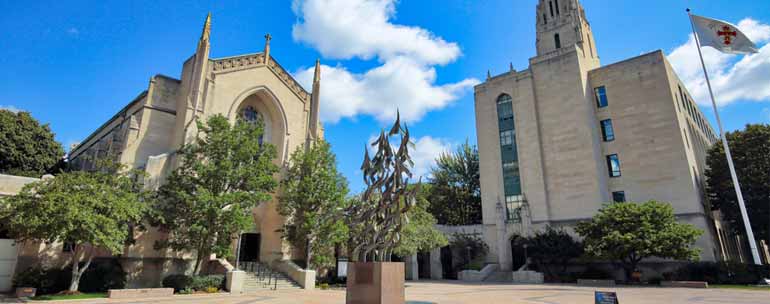
Boston University offers a part-time MSW program that can be completed in 3 or 4 years. Students typically earn 3 to 6 credits per semester, and summer semesters are an option for those who want to accelerate their degree progress. Classes include core subjects in theory and practice as well as electives and seminars.
Boston University is accredited by the New England Commission of Higher Education.
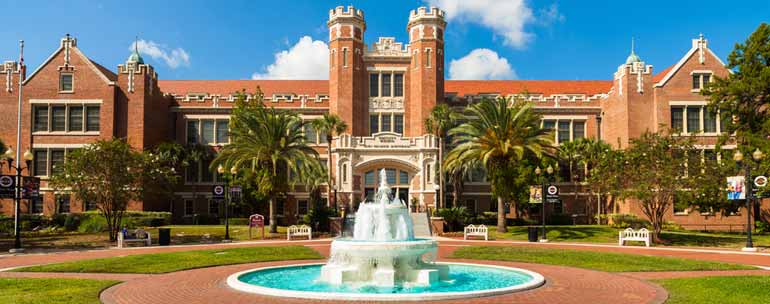
The online MSW program at Florida State University was the first of its kind. Today, it’s still an option alongside traditional, in-person classes. Degree tracks are available for both advanced standing or traditional students, depending on previously-earned credits in social work.
Florida State University is accredited by the Southern Association of Colleges and Schools Commission on Colleges.

Ranked #25 in the US News and World Report, the social work program at Fordham University delivers a comprehensive education on today’s issues, theories, and challenges. Students will engage in interactive coursework as well as structured field experience. Programs are available for both full-time and part-time learning.
Fordham University is accredited by the Middle States Association of the Commission of Higher Education.

Specializing in clinical and community practice, the masters social work degree at Indiana University prepares students for work in schools, hospitals, government agencies, mental health clinics, and more. Classes cover everything from diversity and sociology to understanding telemedicine and raising money for nonprofits.
Indiana University is accredited by The Higher Learning Commission.

Divided into the “foundational year” and the “advanced year,” the MSW program at Louisiana State University takes a structured approach to social work education. It requires 60 credits and 2 to 4 years to graduate, depending on full-time or part-time status. An internship for each phase of the program is required.
Louisiana State University is accredited by the Southern Association of Colleges and Schools Commission on Colleges.

With online classes and shortened, 11 week semesters, Portland State University makes it easy for busy professionals to earn an advanced degree. Its social work program has two focus areas: Health Across the Lifespan as well as Practice and Leadership with Communities and Organizations.
Portland State University is accredited by the Northwest Commission on Colleges and Universities.

Rutgers University offers several specializations in social work, including clinical practice as well as management and policy.
Students take classes in a wide range of human services topics, complete fieldwork, and engage with mentors and employers for post-graduation placement. There’s also an intensive weekend program for students who can’t take courses during traditional hours.
Rutgers University is accredited by the Middle States Commission on Higher Education.

Simmons University offers both a masters program and a bachelors to masters program in social work. You can also choose between extended and accelerated schedules, depending on your timetable for graduation. There’s even an intensive, 16 month program that combines online and in-person classes with rigorous weekly fieldwork.
Simmons University is accredited by the New England Commission of Higher Education.

The MSW program at Temple University is highly flexible in terms of classes, concentrations, and full-time and part-time schedules. Students can choose the path that works best for them while also learning theory, practice, policy, and ethics in social work. It typically takes 2 to 4 years to complete.
Temple University is accredited by the Middle States Commission on Higher Education.

Texas State University offers a graduate degree in social work with a concentration in advanced practice leadership (APL). These classes cover topics such as communication, organizational behavior, and business administration in addition to social- and health-related education. It requires 62 credit hours to complete.
Texas State University is accredited by the Commission on Colleges of the Southern Association of Colleges and Schools.
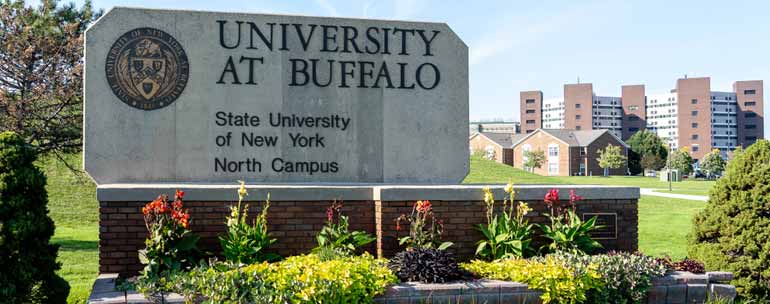
Earned through a hybrid, part-time program, the MSW at the University at Buffalo prepares students for work in a variety of health and human services fields. It requires 60 credits and a minimum of 15 fieldwork hours per week. There are also opportunities to earn certificates or complete internships that can count towards the degree.
The University at Buffalo is accredited by the Middle States Commission on Higher Education.

The social work program at the University of Alaska – Anchorage runs parallel with its public health program. Classes will count for both degrees, so students can choose to enroll in a dual degree program to maximize their learning experiences and certification opportunities. Upon graduation, they’ll meet the requirements for Alaskan licensure.
The University of Alaska – Anchorage is accredited by the Northwest Commission on Colleges and Universities.

At the University of Central Florida, a masters degree in social work can be earned with 62 credits across a series of 7 week terms. You can enroll at several points throughout the year, and no previous experience in social work is required. If you do have previous experience, you can join an expedited program with only 32 credit requirements.
The University of Central Florida is accredited by the Southern Association of Colleges and Schools Commission on Colleges.

The MSW program at the University of Denver is ranked #17 on the US News and World Report. It’s fully accredited and divided into different specializations, depending on the student’s talents and interests. Focus areas include mental health and trauma as well as health, equity, and wellness.
The University of Denver is accredited by the Higher Learning Commission.

Offering both full-time and part-time schedules, the University of Houston has a very flexible program for masters level social work.
Classes are available in everything from psychology and cognitive development to budgeting and grant writing. Coursework can be completed online, face-to-face, or in a hybrid format. The program requires 63 credits to graduate.
The University of Houston is accredited by the Southern Association of Colleges and Schools Commission on Colleges.
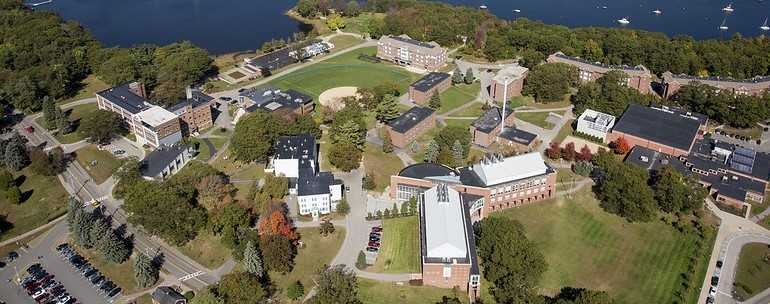
In addition to its MSW, the University of New England also offers three certificates in the areas of applied arts and social justice, training in aging and diversity, and trauma-informed care. Their curriculum is devoted to the development of real-world skills as well as theories and practices that can help with today’s challenges in social work.
The University of New England is accredited by the New England Commission of Higher Education.
Getting Your Part Time MSW Online

If you want a career that involves helping others, then maybe a master’s degree in social work is your next step. There are many options available for obtaining your MSW if you believe that social work is the right path for you.
Part time degree programs may allow you to earn your masters and continue working at your current job. For highly flexible scheduling, you may also want to consider online MSW degree programs. After you complete your masters program, you can also continue on in a part time PhD program if you decide a doctorate degree will be of benefit to you.
Regardless of whether you’re earning an associate’s degree in social work or a master’s in social work, you’ll be embarking on a career aimed at helping others. If you’re ready to start the next step of your educational journey, you can begin today by exploring accredited universities.

